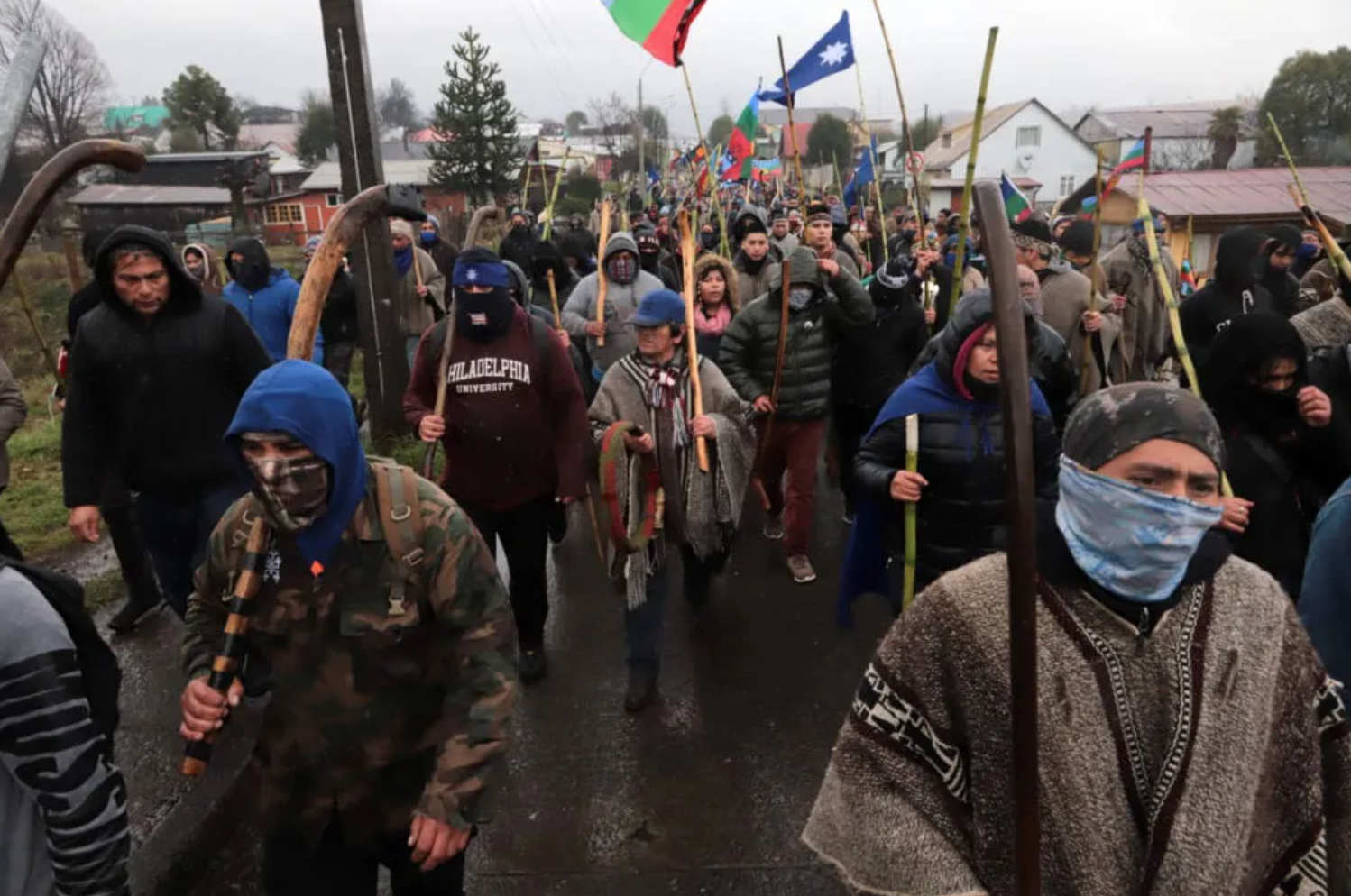The conflict between the Chilean State and the Mapuche people has become an insoluble problem for all the governments that since 1990 have tried similar recipes with unsuccessful results. Grandiloquent intervention plans, repression, or futile dialogue tables are some of the policies that have been employed. The result? An abject toll of death, human rights violations, prisoners, arson attacks, and communities’ militarization.
The first weeks of Boric’s government were difficult. The visit of the Minister of the Interior, Izkia Siches, to the community of Temucuicui, from which she had to leave in haste after shots were fired nearby, was followed by the resignation of a Mapuche advisor to the government and the subsequent implementation of the state of emergency.
In spite of this, the government launched the Plan Buen Vivir (Plan for Good Living) with which it intends to establish a different relationship with the native peoples, encouraging the restitution of lands or the reactivation of the project of the Ministry of Indigenous Affairs and investments, as well as security plans to face violence, among other measures. In addition, the government has maintained its willingness to establish a transversal dialogue for the solution of a conflict that it describes as political and, therefore, requires a political solution.
Much of the aforementioned situation does not differ from what has already been implemented by other governments. Whether due to the political context or the pressure from the right, the political path promised since the campaign continues to be a debt, and these days another extension of the state of emergency will be discussed again.
A conflict that has marked all governments since the return to democracy.
It was known that this would be a complex issue to face during the mandate of President Gabriel Boric. There were a myriad of problems that he inherited from the government of Sebastián Piñera: the human rights violations and abuses committed since the October 2019 social outburst; the pandemics’ effects on the economy, or leading the country in the context of the controversial new Constitution drafting. Added to this was the Chilean-Mapuche conflict.
All post-dictatorial governments have experienced such confrontation and none has achieved significant progress. Without going any further, Boric’s government, like his predecessor, maintained the state of emergency in the south of the country, at the epicenter of the conflict. A conflict that sinks its shameful roots in the history of Chile since the military invasion of Mapuche territories at the end of the 19th century, euphemistically known as the “Pacification of Araucania”. This was followed by the subsequent process of settlement and reduction of the communities and the colonization encouraged by the state for the occupied territories.
The Mapuche were vehemently subdued and forcibly integrated into the new Chilean nation-state. Their culture, language, worldview, and history had no value, being a tangible expression of a supposed barbarism which, by the way, was opposed to the enlightened civilization promoted by the nineteenth-century liberalism that the Chilean elite imposed on the country.
A relationship of domination with the Mapuche people has been built on these foundations, which in the 1990s saw the emergence of a movement that became a constant and present political actor. During the transition to democracy and with the resistance to the commemoration of the V centenary of the Hispanic conquest in the background, this movement emerged as an actor with incidence and confrontation with the state and forestry companies in 1997 after the burning of three forestry trucks in the communities of Pichiloncoyan and Pililmico, in the Lumaco sector in the Araucanía region of southern Chile.
This was a turning point for the movement and its relationship with the state, but also in terms of positioning its demands on the agenda, moving from the land demand of the 1970s to claim their collective rights over the territory and autonomy as an expression of the right to self-determination of the peoples. This transition developed, moreover, in an autonomous manner, detached from the influence of Chilean political parties.
The beginning of the 20th century witnessed a heterogeneous movement with manifestations and repertoires of collective action of all kinds, ranging from violence and sabotage to participation in elections. This multiplicity of organizations share as their objective the struggle for territory and autonomy for the Mapuche people, as well as the conviction of their own path, detached from the paternalism of the political parties.
According to the Mapuche historian Fernando Pairican, there would be two sides or souls. On the one hand, there would be the gradualist organizations, among which he mentions Ad Mapu, the Lafkenche Territorial Identity, and the right-wing ENAMA, in addition to the participation in the Constitutional Convention. On the other hand, there would be those that he describes as rupturist, such as the Arauco-Malleco Communities in Conflict Coordinator (CAM) born at the end of the 90s, Weichan Auka Mapu and Lafkenche Resistance, among others.
The latter organizations have implemented since 2021 processes of territorial recovery, sabotage of forestry machinery and trucks, as well as attacks on individuals, thus initiating an escalation of violence that has not stopped during Boric’s government. On the contrary, despite the calls for a transversal and substantive dialogue made by the new government, the actions and violence have continued.
Moreover, before the triumph of Gabriel Boric, the CAM issued a communiqué in which it described the government as a “new hippie, progressive and cool left” and expressed its right to “continue resisting and to vindicate political violence as a legitimate instrument of our struggle, whoever is governing and whoever maintains the pattern of capitalist accumulation and its colonial scaffolding”.
It is unofficially estimated that during 2022 there have been just over 150 violent actions in what is known as the southern macro-zone. This has led the government to insist on the systematic renewal of the state of emergency, thus contradicting the demilitarization of the communities that they had proposed during the campaign.
In this context, it is difficult to judge the new government in a definitive way after only three months and in fact, it may be that the constituent process is not the most appropriate for reforms of this type promoted by the government.
Currently, substantive and long-term transformations are being disputed, as stated in the first paragraph of Article 1 of the proposed new constitution: “Chile is a social and democratic State of law. It is plurinational, intercultural, regional and ecological”. But beyond the results finally achieved, an essential part of this achievement is due to the work of the Mapuche representatives in the Convention, many of whom come from what has been described as the gradualist side of the Mapuche autonomous movement.
Translated from Spanish by Janaína Ruviaro da Silva












